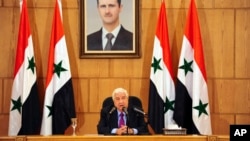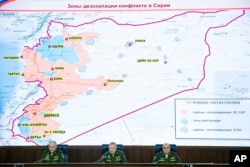Syria's foreign minister Walid al-Moallem says no foreign forces will be allowed to monitor the "de-escalation" agreement in four zones around Syria in another effort to end the long civil war.
Russia, Turkey and Iran signed the deal last week in Astana, Kazakhstan. It calls on Syrian forces and rebels to reduce their fighting in the special zones.
Final details still need to be worked out, including questions on how the Syrians and rebels plan to tone down the violence. Neither side signed the pact.
"There will be no presence by any international forces supervised by the United Nations," al-Moallem said Monday.
But he added that Russia, as guarantor of the agreement, said there would be "military police and observation centers."
The minister gave no details on who would make up that police force.
U.S. Defense Secretary James Mattis said Monday there are still a lot of questions about the agreement.
"We'll look at the proposal, see if it can work. Will it affect the fight against ISIS? I think the international community is united in the sense of wanting to see ISIS put on its back foot," Mattis said, using an acronym for Islamic State.
The United States has backed the idea for "safe zones" in Syria.
Meanwhile Monday, the first wave of rebel fighters and their families evacuated the Barzeh district of Damascus under a surrender agreement reached with the government.
More than 1,000 people are expected to leave the district aboard buses and Red Cross ambulances in the coming days
Similar surrender deals in exchange for safe passage from rebel-held Damascus neighborhoods are expected.


